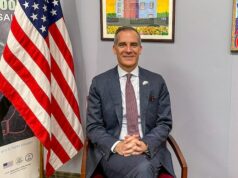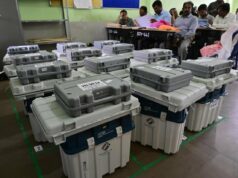US Elite Needs To Change Their Mindset When It Comes To Engaging India

Today’s India is ready to stand up to China and rebuff its bullying with equal measures, something which the West has unable to do so far it also has the self-confidence to ignore idiotic, misinformed and highly biased Criticism emanating from a section of the American politicians and the Western media.
India-US people to people ties will continue to grow because of their fundamental strategic convergence and Indian democracy the oldest in the world will keep evolving in its own Unique way. The challenge for New Delhi is to configure a strong domestic values which will allow India to withstand such pulls and pressures.
Even when India was on the margins of global politics, economics and military, it never became a Camp Follower of any power big or small. Today India is at the very core of World Politics with a strong government and an aspirational population. If India could stand up to the world bullies in the 1980s and 1990s when the nation was perhaps at its most vulnerable, there is no reason why today’s India should worry about America’s proclivities of “ nose poking into other affairs “.
The Biden administration early in its term requested for convening a meeting of the Quadrilateral Grouping at the Ministerial level a few weeks back. Thus indicating about the priorities of Washington as well as the enduring relevance of the quadrilateral platform with all the attendant implications.
India joined Australia, Japan and the United States for the ministerial meeting of the Quad – which underscored its commitment to upholding a rules-based international order, underpinned by respect for territorial integrity and sovereignty, rule of law, transparency, freedom of navigation in the international seas and peaceful resolution of disputes.
And last month, in a phone call between President Biden and PM Modi, the two leaders tried to set the bilateral policy agenda wherein two issues emerged as the core of their engagement: climate change and a free and open Indo-Pacific. For the Biden administration, a renewed focus on the climate agenda is one of the most serious ways of underscoring its differences with the Trump administration.
From appointing former secretary of state John Kerry as its special climate envoy to rejoining the Paris climate agreement, the new political dispensation in Washington is signalling its priorities of America once again joining the global multilateral mainstream. And India under Modi is rapidly positioning itself to emerge as a serious stakeholder in climate change conversations, with India expected to go beyond its Paris agreement targets provided the developed World does not back out from its given commitments.After all fo last 3 years, it is the so called developed World which has brought the World Climate to thiscrical level.
This is indeed a remarkable turnaround for the Worlds biggest “ polluted “ that till a few years back was widely viewed as a “naysayer” in climate change debates, thus providing a Common issue area for New Delhi and Washington to shape the next stage of their bilateral engagement.
The idea of a free and open Indo-Pacific, of course, continues to be the other aspect of this engagement which is not only important for the two nations but also to a large number of their partners in the rapidly evolving maritime geography. Against the backdrop of a rising and aggressive China, Modi and Biden “reiterated the importance of working with like-minded countries to ensure a rule-based international order” and “also agreed to continue close cooperation to promote a free and open Indo-Pacific, including support for freedom of navigation, territorial integrity and a stronger regional architecture through the Quad.”
Within just about a month of taking office, the Biden administration’s outreach to India has been robust and substantive. And yet there is a strange proclivity in sections of the US strategic establishment to continue to bend this relationship based on equality to their own Will. What is even more troubling is that a partisan approach has begun to colour some of the Indian elites, presently politically ruderless, attempting to help the West to intervene in Indian domestic matters. Those who in 50s to 80s stood up to the West today seem ready to invite Washington to rake up issues belonging to Indian sovereign space.
Every administration is unique, with a different set of foreign policy and domestic priorities which shape their global engagement. What has been truly remarkable about India-US ties over the last two decades is that despite different administrations and different leadership styles, the bilateral relationship has only grown from strength to strength because it is based on equality and not severility.
Things looked bad when Barack Obama repudiated the civil nuclear deal before his election to the presidency and when he talked of Kashmir as being part of the wider Afghan problem. But when he left office, he had forgotten about all this and was a self-proclaimed “great friend” of India. Similarly, we were concerned when Donald Trump railed against India during his campaign and often managed to put India and China in the same bracket. But again his treatment of China and India was a study in contrast while in office, and his contribution in shaping the wider Indo-Pacific to India’s advantage cannot be denied.
And now with the Biden administration, “ human rights issues” might derail the relationship. And some in India, in their dislike for the ruling dispensation, have actually gone so far as to advise Washington to challenge the Indian government on internal matters.
It is beside the point as to what the Biden administration will or won’t do. Despite its evident limitations all Western nations, and in particular the US, are tempted by this desire to shape the domestic socio-economic and political discourses in other societies.
The USA elite must know that any relationship with India will have to be based on mutual respect, equality and friendship. Any contrary actions like repeated resolutions in the US Congress on Kashmir or Punjab in the garb of human rights or threat of CAATSA will now be reciprocated in equal measures with Indian resolution on treatment of Blacks, Racial profiling at Immigration and host of other issues. New Delhi’s reactions will be resolute and categorical.



